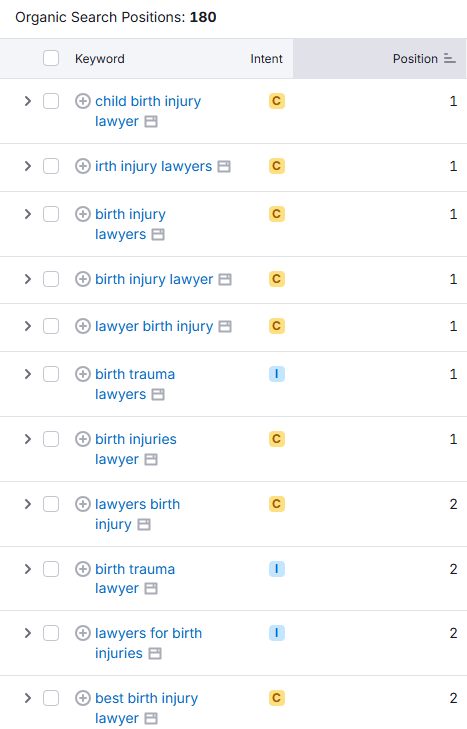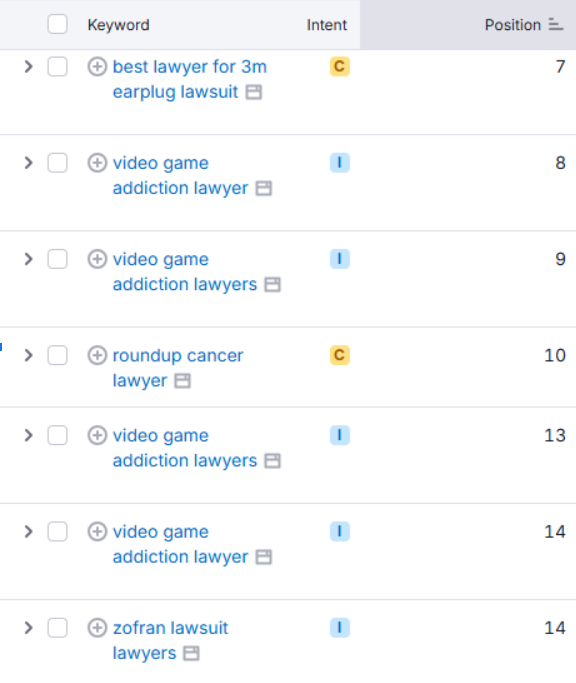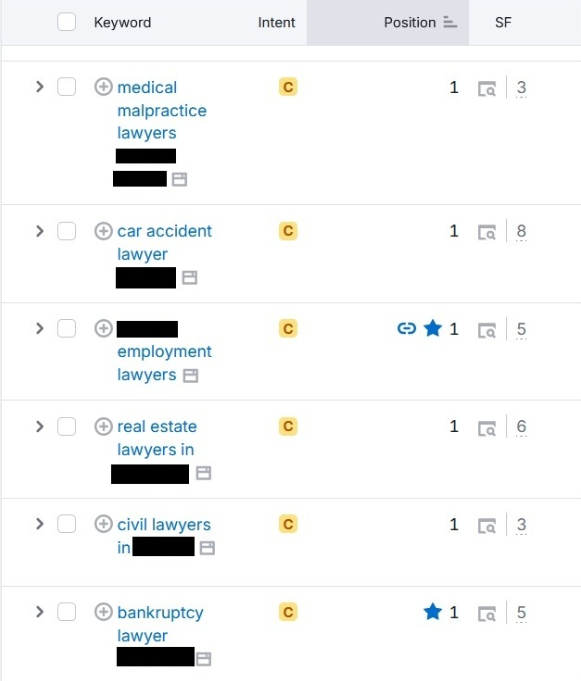Your website should reflect your business. If your law firm represents clients in a single practice area (e.g., personal injury), create a niche website with content demonstrating your deep experience and knowledge of that subject.
On the other hand, if your firm spans multiple legal areas (e.g., bankruptcy, criminal defense, estate planning, family law, etc.), you’ll have to decide whether to demonstrate your expertise on a single broad site or across multiple niche sites. Generally, you’ll do the former unless you represent clients under truly distinct businesses and brands.
This blog will help you determine which strategy wins for you.
What is the difference between a broad website and a niche website?
A broad site covers a wide range of topics, products, or services. A niche site goes deep into a specific area. For a law group, a broad site advertises diverse types of legal cases, while a niche site targets a single practice area.
How does the choice between broad and niche impact SEO?
Intuitively, it may seem that a site dedicated to one topic is easier to rank for important search terms. Niche sites allow you to hone your law firm’s content, links, and authority around a focused practice area and related keywords. If you create a website focused exclusively on personal injury, for example, the site will contain deep knowledge, insight, and perspectives on personal injury, allowing you to build your site’s authority in that space.
By contrast, if your site covers multiple practice areas, it contains content across many diverse areas of law. Theoretically, it becomes harder to establish your site’s authority in any one area.
But that doesn’t mean it’s impossible.
Niche sites for firms serving multiple specialties under distinct brands
If your business represents people across different practice areas under different brand names, then building niche sites for each brand might be your best option. For example, suppose you:
- Represent personal injury clients under the brand ABC Injury Law
- Represent bankruptcy clients under Acme Bankruptcy Law
- Represent criminal defense clients under Acme Law Firm
There should be no harm in creating websites for each of those businesses, each building its authority in its niche.
One of our clients found success with a similar approach. He has two distinct websites, each serving different niches. The first is a site devoted to birth injury cases. He’s spent years building that site and his authority in the space. The site ranks in the #1 spot for a litany of highly coveted terms.

Another of his businesses represents clients in the personal injury and mass tort space. It’s a truly distinct business and brand from his birth injury business, so he created a different website for it. The injury site isn’t yet where the birth injury site is – it’s much newer – but it’s starting to rank for some coveted mass tort terms.

If you represent clients across multiple specialties under distinct businesses and brands, it’s usually best to create separate sites for each of them.
Broad sites for firms serving multiple specialties under one brand
If you represent clients across multiple specialties under one business and brand, that’s another story.
Say you represent clients in family law, estate planning, and personal injury. And you do it under one business and brand. If you make distinct sites for each practice area, each touting Acme Law Firm’s services, you’re spreading your budget thin and, in a sense, creating competing websites.
You’re better off creating one single website that covers all your diverse practice areas. That’ll present some challenges, but it would authentically represent your business. And Google is smart enough to recognize that firms can have expertise in more than one practice area.
To find success with a broad website, you’ll have to spread your content budget across a few practice areas to build authority in each. It can be done.
Here is an example of a law firm that offers myriad legal services under a single brand name.

This screenshot from SEMrush shows some of the keywords it ranks for in the top position. Over a one-month period, they ranked in the top 3 for 1,198 keywords specific to personal injury, malpractice, employment law, real estate law, civil rights, bankruptcy, and several others.
This law firm ranks in the first position for a considerable number of valuable, conversion-focused keywords and does so across varied legal specialties. Google sees this website as an authoritative, relevant result for users searching for legal help in diverse areas of law.
You can rank your site for multiple practice areas using a broad website approach if you have helpful content and high authority (e.g., recent positive reviews and ratings and credible backlinks) in those areas. So, if you represent clients across a broad range of practice areas under a single brand, you’re generally better off creating a single site.
What are the challenges of niche and broad websites?
Whether you create a broad or niche site, you’ll face some challenges. Here are some of them:
| Factor | Broad Approach | Niche Approach |
| Target audience | Has a wider, more general audience | Targets a specific segment with unique needs |
| Market competition | High competition against large players with significant resources | Easier to dominate a smaller, well-defined market segment |
| Brand positioning and authority | Good for versatile providers, but can risk diluting your authority | Good for specialists, which can lead to greater authority and trust |
| Audience engagement and customer loyalty | May struggle to build deep, long-lasting relationships with a diverse audience | Can achieve stronger engagement through tailored content |
| Scalability | Easier to scale as you target a wider audience | Limited audience, but you can still expand within a niche market |
| Risk and flexibility | More flexible and easier to manage an underperforming segment | More risk, but may be easier to adapt to changes within audience or industry |
| Budget and resource allocation | Requires more resources to reach audiences across multiple channels | More cost-effective, allows for more targeted and personalized campaigns |
Niche law firm websites can more easily gain traction with focused optimization, while broad sites require extensive strategies across an expansive topic base to compete.
Should I dip my toes in the waters outside my niche?
That’s hard to do. Ranking organically for coveted search terms isn’t a case of “if you publish it, they will come.” To rank for those coveted terms in the organic results, you need to establish EEAT in the subject area. That takes time and resources.
If you’re successful at representing personal injury clients, create a robust niche personal injury site. Avoid the temptation to add a page about criminal defense or estate planning purely to cast a few more lures into the water; they won’t necessarily lead to additional traffic or cases.
Before diverting part of your SEO budget outside of your niche, consider the following:
- Are you equipped to handle the leads you get from those pages?
- Is expanding your repertoire part of your law firm’s long-term plans?
- Are you willing to devote resources to establish your expertise in a new specialty?
Unless you plan to make those specialties a serious part of your practice, you’re probably better off focusing your SEO budget on your niche rather than diluting it with practice areas you do not handle.
The verdict? It depends on your firm.
Both niche and broad websites have their challenges. It comes down to this: focus on what you do best. In other words, your website should reflect your firm.
Are you ready to get started with an assessment of your current website strategy? We’ll help you elevate your law firm’s online presence and align your website with your business goals for greater, measurable success.
Contact us today to schedule a free 30-minute consultation and unlock your firm’s full potential.

Alex Valencia is an influential entrepreneur, marketer, speaker, podcaster, and CEO of We Do Web Content, one of Inc. 5000’s fastest-growing businesses in America. His agency implements game-changing content marketing strategies and produces top-ranking web content for law firms, medical professionals, and small businesses nationwide.

